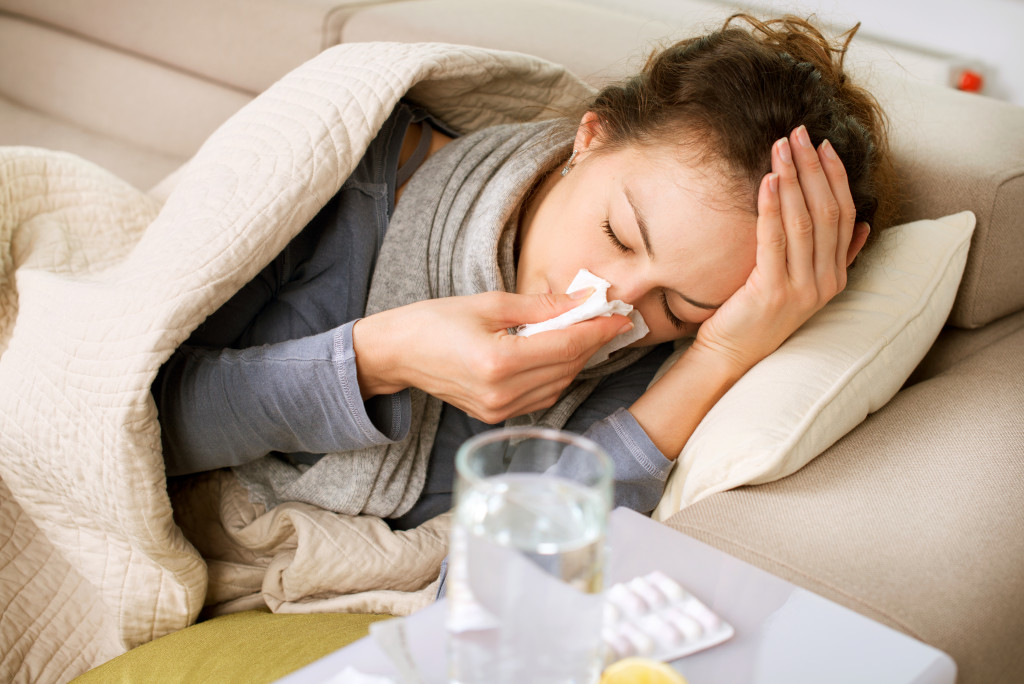- Influenza (Flu) is one of the most common winter diseases, with symptoms including fever, runny nose, and extreme fatigue.
- Common cold is another virus spread through air contact, with symptoms including stuffy nose and sore throat.
- Hypothermia is a dangerous condition caused by prolonged exposure to cold weather, with symptoms including confusion and loss of consciousness.
- Seasonal Affective Disorder (SAD) is a type of depression that occurs during winter when days are shorter and nights are longer.
- Asthma can be triggered by cold weather, with symptoms including chest tightness and coughing.
The low temperatures, harsh winds, and dry air make it easy for viruses and bacteria to thrive and for people’s immune systems to be compromised. It’s essential to be aware of the most common cold weather diseases and how to protect your family from them. Here are some of the most severe health concerns you may face this winter and how to stay healthy and happy despite the cold.
Influenza (Flu)
This viral infection is one of the most common diseases during winter. It spreads through the air as well as direct contact with the infected person or object. Anyone can catch the flu, but it can be especially serious for pregnant women, young children, and the elderly.
Symptoms include fever, runny nose, headache, sore throat, cough, and extreme fatigue. To avoid getting the flu, make an appointment with your healthcare provider to get a flu shot. Regular handwashing, avoiding close contact with people who are sick, and staying home if you are unwell or have flu symptoms can also help minimize the spread of the virus.
Common Cold
The common cold is a viral infection that is prevalent in the winter. It spreads through the air when the infected person coughs, sneezes, talks, or through contact with the infected person or object.
Symptoms include runny or stuffy nose, sore throat, cough, body aches, and fever. To prevent catching a cold, wash your hands frequently, avoid touching your face, cover your mouth and nose when coughing or sneezing, and stay home if you are not feeling well.

Hypothermia
Hypothermia is a dangerous condition caused by prolonged exposure to cold weather. It occurs when your body temperature drops below 95°F (35°C), impairing your ability to function normally. Symptoms include shivering, confusion, drowsiness, slurred speech, and loss of consciousness. To prevent hypothermia, it’s vital to dress warmly in layers, wear a hat and gloves, use a scarf to cover your mouth and nose and limit your exposure to cold weather.
Seasonal Affective Disorder (SAD)
SAD is a type of depression that occurs during the winter months when the days are shorter and the nights are longer. Symptoms include sadness, lack of energy, hopelessness, irritability, and changes in appetite and sleep patterns. To manage your symptoms, exercise regularly, take vitamin D supplements, maintain a healthy diet, and get plenty of sunlight.
Asthma
Winter weather can trigger asthma attacks in people with sensitive airways. The cold air, low humidity, and breathing in irritants such as smoke, dust, and mold can all cause asthma symptoms. To prevent asthma attacks, take your prescribed medication as directed, avoid smoke and other irritants, wear a scarf over your mouth and nose when you go outside, and keep your living spaces clean.
Preventing Sickness During Cold Weather
There are also various ways you can prevent sickness when the cold weather sets in. Here are ways you can do that:

Insulation
Your home’s insulation is vital in keeping you safe and healthy during the winter. Ensure your home is adequately insulated to reduce the risk of hypothermia and other cold-weather illnesses. Here are some great insulation options for your home:
- Spray foam: One of the most affordable and effective insulation options available.
- Fiberglass: Lightweight, easy to install, and effective at trapping air inside your home.
- Cotton: A great natural option for those looking for a more eco-friendly option.
- Vapor barrier: A plastic or foil sheet installed on your home’s interior walls to help reduce heat loss and keep your home more energy efficient.
Heating
If your home is not adequately heated, it can increase the risk of cold weather illnesses. Invest in a reliable heater and ensure your home stays at a comfortable temperature throughout winter. If you want something rustic, consider installing a robust fireplace. You can gather around the warmth of a well-maintained fire and enjoy quality time with family and friends.
Regular Maintenance
Regular heating system maintenance is also essential for staying healthy during the winter. Have a professional inspect your home’s heating system, furnace, air conditioner, and other essential components to ensure they work properly and safely. You should also have the chimney cleaned yearly to guard against smoke and other pollutants entering your home.
Getting Some Sunlight
One of the most natural ways to keep your immune system strong is to spend some time outdoors in the sun. Take a walk, bike ride, or simply sit outside and enjoy nature’s beauty. The sunlight helps boost Vitamin D levels and regulate your body’s internal clocks, allowing you to stay healthy and energized during these cold months.
Following these tips can help protect yourself and your family from cold weather illnesses this winter. Remember to be aware of the signs and symptoms of illness, get a flu shot, dress warmly in layers, stay hydrated, and keep your living spaces clean. With some preparation, you can stay safe and healthy throughout winter.